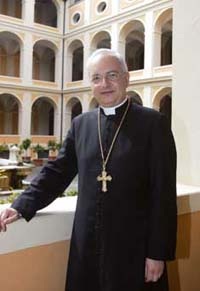Year of the Priest: July 2009 Archives

"Are you resolved, with the help of the Holy Spirit, to discharge without fail the office of the priesthood in the presbyteral order as a conscientious fellow worker with the Bishop in caring for the Lord's flock?"
The Archbishop-Secretary of the Congregation for the Clergy, Mauro Piacenza, wrote to the world's priests on July 15th reflecting on the liturgical theology that identifies and supports the theology of priesthood. Now that we are clearly in the Year of the Priest we have to make solid effort at connecting our daily prayer for priests (and, those preparing for ordination) and education on what the Church believes and teaches about the priesthood. This year dedicated to the priesthood is not only directed to renewal and reform of the priesthood but also conversion of the entire Church. The year of priestly renewal is not merely centered on prayer for the local priest (which is most essential) but also a time for some intellectual formation for both priest and people. So, the proposal of the Pope is that we give a sufficient attention to both prayer and education, not one or the other. I'd like to note that I find myself disappointed to see the lack of a public of storming heaven for the graces of renewal but also the lack of sufficient discussion of what the Church teaches and believes. What to do? In the meantime, Archbishop Piacenza offers a number of juicy tidbits to consider. He said in part:
The
Church, in her maternal wisdom, has always taught that the ministry is born of
the encounter of two freedoms: divine and human. If on the one hand one must
always recall that, "no one claims this office for himself; he is called to it
by God" (CCC n.1578), on the other hand, clearly, it is always a "human and
created I", with his own story and identity, with his own qualities and also
his own limitations, who responds to the divine call.
The
liturgical-sacramental translation of this asymmetric and necessary dialogue
between the divine freedom which calls and the human freedom which responds is
represented by the questions which each of us has had addressed to him by the
Bishop during the rite our own ordination, immediately prior to the imposition
of hands. We shall revisit together in the months ahead this "dialogue of love
and freedom".
We
have been asked, "Are you resolved, with the help of the Holy Spirit, to
discharge without fail the office of the priesthood in the presbyteral order as
a conscientious fellow worker with the Bishop in caring for the Lord's flock?"
We answered, "I Am"
The
free and conscious response is based, therefore, on an explicit act of the will
("Are you resolved to discharge the office", "I am") which, as we know well,
requires to be continuously enlightened by the judgement of reason and
sustained by freedom, so as not to become a sterile voluntarism or, worse, to
change over time, becoming unfaithful. The act of the will is enduring of its
very nature, because it is a human act, in which the fundamental qualities of
which the Creator has made us participants are expressed.
The
undertaking, then, that we have assumed is "for the whole of life" and thus not
related to fads or indulgences much less to sentiments, which might be apparent
to a greater or less degree. While feelings may be said to have a role in
coming to the knowledge of the truth, it is only so as to direct out focus in
such a way as not to obstruct such knowledge but to assist the discernment of
it. Nevertheless, this is but one aspect of consciousness and cannot be its
determining factor.
Our
will has accepted to exercise "the priestly ministry", not other "professions"!
Above all else we are called to be priests always and, as the Saints remind us,
in every circumstance, exercising with our very being that ministry to which we
have been called. One does not merely act as a priest: one is a priest!
Each
one of us is part of a dynamic entity, called to collaborate by demonstrating,
each in his own way, the Head of this Body: always as "fellow workers with the
Bishop", in obedience to the good which he indicates, and "under the guidance
of the Holy Spirit", that is in praying with each breath. Only he who prays can
hear the voice of the Spirit. As the Holy Father recalled in the General
Audience of the 1st July last, "Those who pray are not afraid; those who pray
are never alone; those who pray are saved!".

